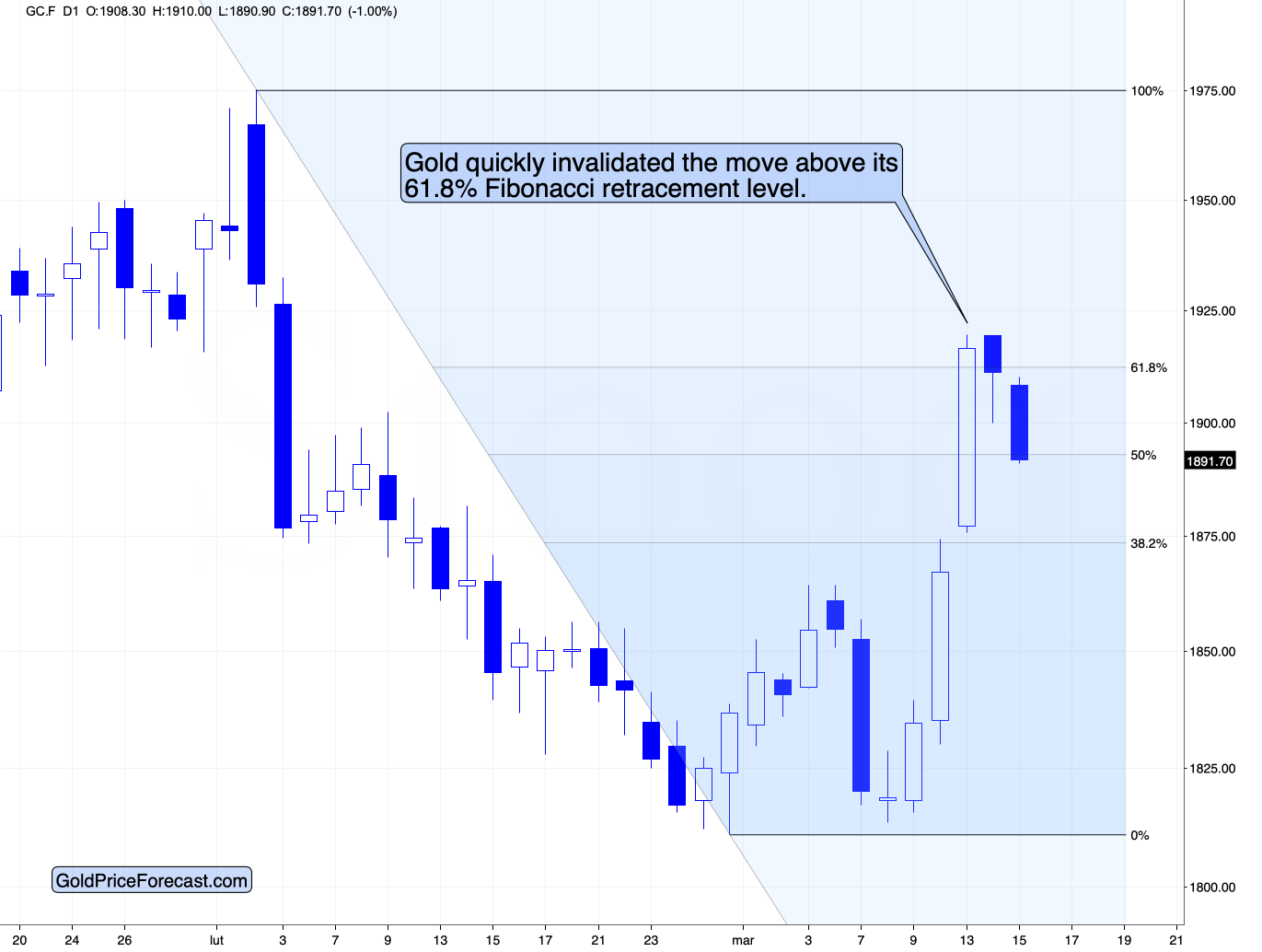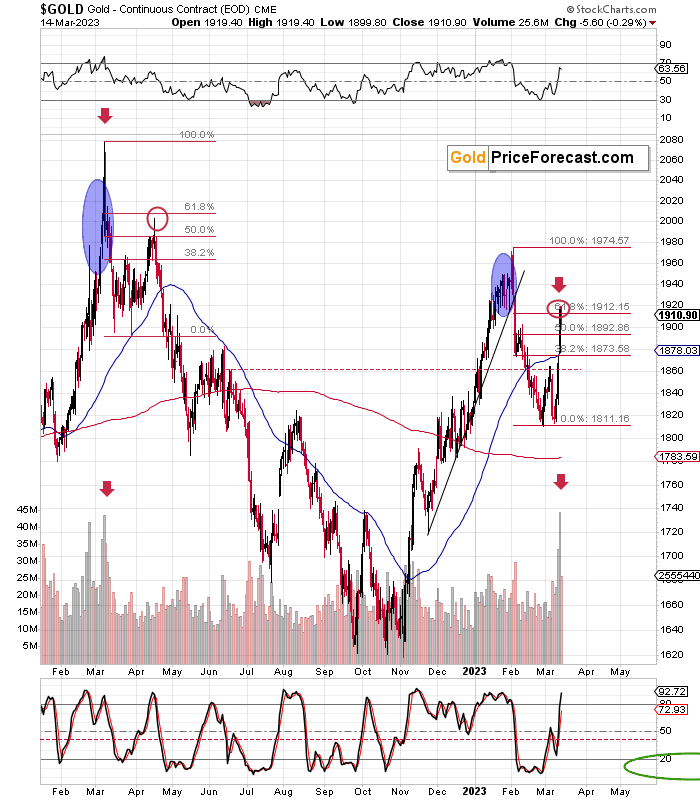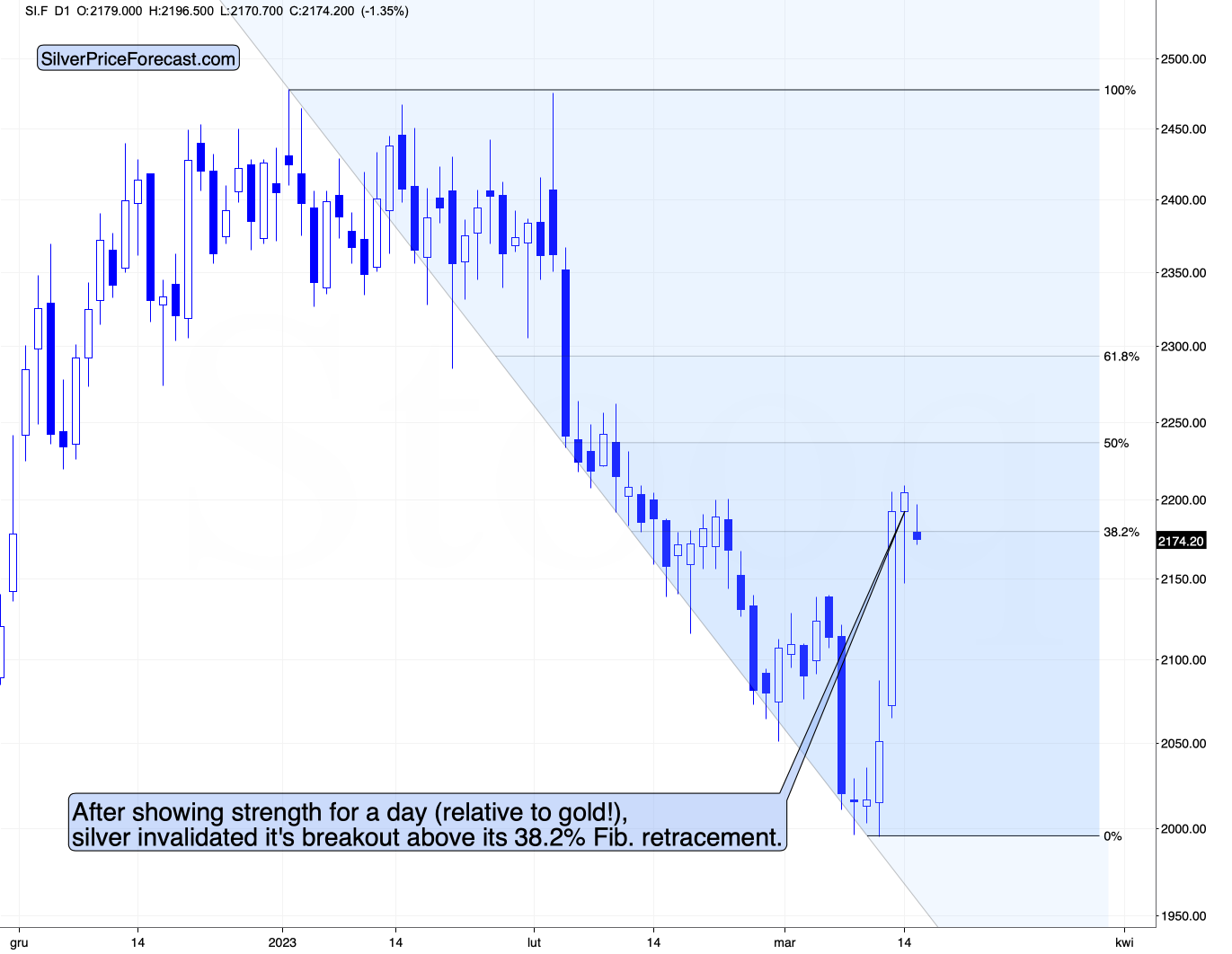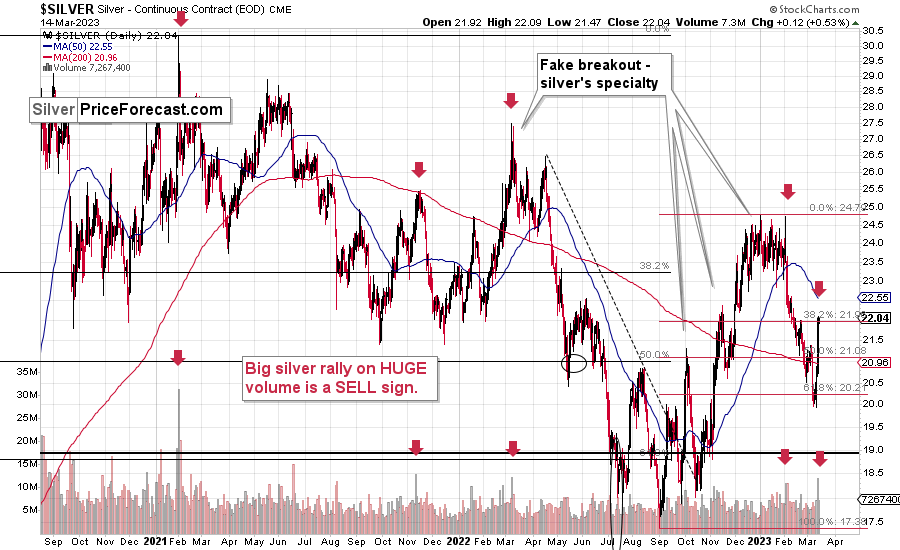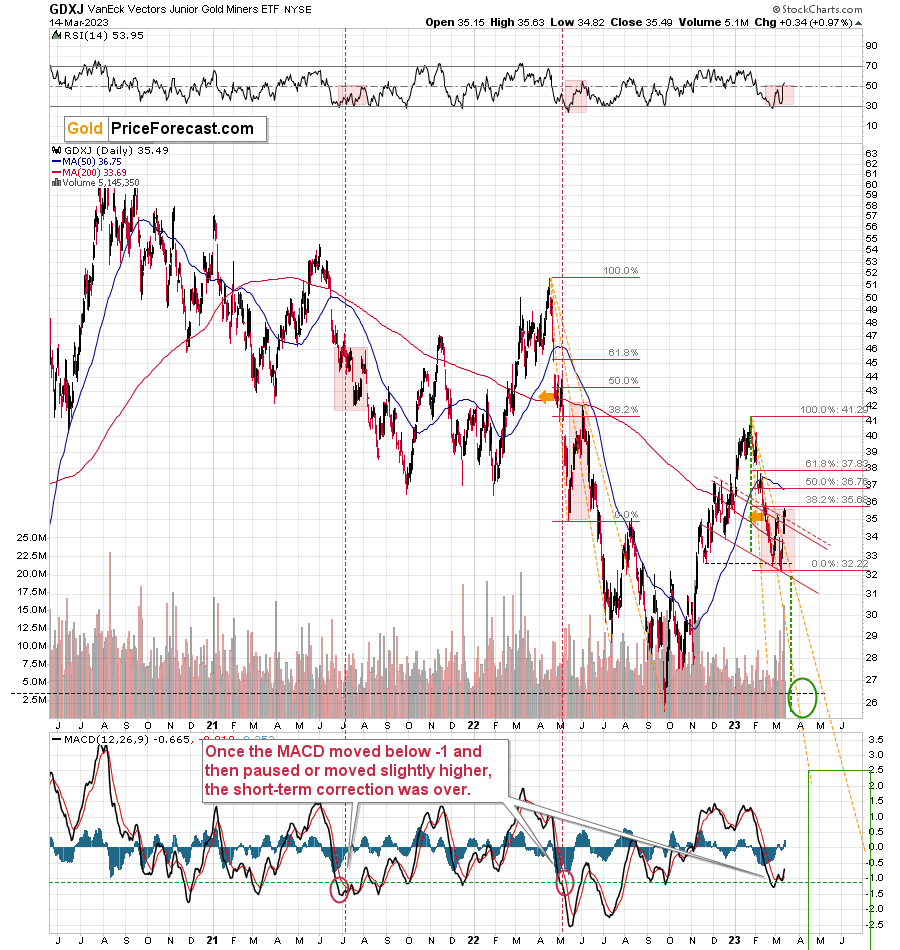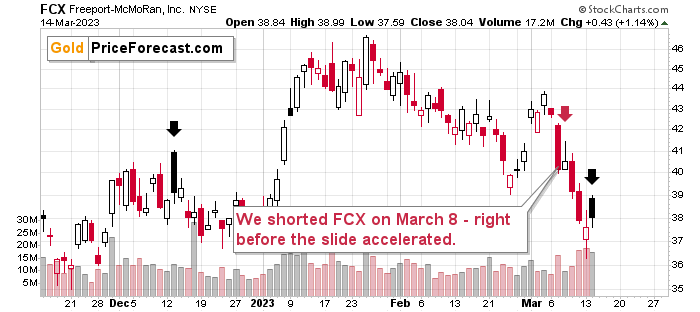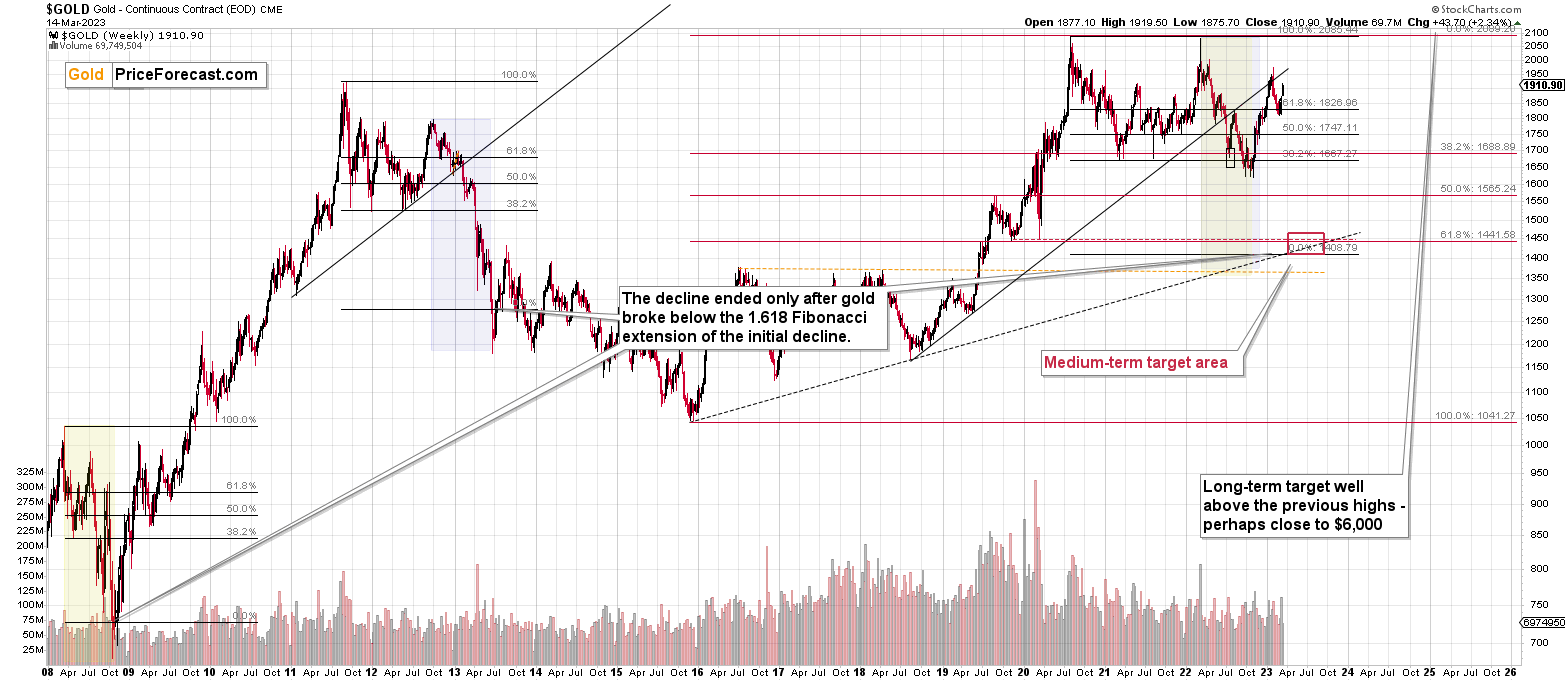Briefly: in our opinion, full (300% of the regular position size) speculative short positions in junior mining stocks are justified from the risk/reward point of view at the moment of publishing this Alert.
Some might consider an additional (short) position in the FCX.
Another day, another indication. These are popping up like mushrooms after a rain. What’s in store for today?
Two major short-term indications and one extra.
The first major indication comes from gold.
Voila!
Gold just invalidated the move above its 61.8% Fibonacci retracement level. In fact, it’s even slightly below its 50% retracement. This means that the link to what we saw about a year ago just got even clearer. As a reminder, I wrote about it yesterday:
Gold also moved on huge volume, and the last time it did so was at its 2022 top.
Also, I’ve been writing about the similarity between now and what happened in the middle of the previous year, but it seems that the analogy should be adjusted. The early 2023 top seems to be similar to the early 2022 top, and what we see now is actually similar to what we saw in mid-April 2022.
In fact, if you consider that gold formed a double bottom in March 2022 and also in February and March 2023, the link becomes even clearer.
Now, how high did gold rally back in April before launching a powerful, almost $400 slide? It rallied (almost) to its 61.8% Fibonacci retracement level.
How high did gold move yesterday? Slightly above its 61.8% Fibonacci retracement level. At the moment of writing these words, gold futures are trading at about $1,906, which means that they have already moved back below the 61.8% Fibonacci retracement, thus making the situation even more similar to what we saw last year.
If the analogy were to continue, what would be the next step for gold? A decline – a powerful one.
Based on what we’re seeing right now, the analogy does indeed continue. The implications are very bearish.
The second indication for today comes from the silver market.
Do you recall what silver is likely to do right before bigger declines?
It’s likely to outperform gold on a very short-term basis. And guess what happened yesterday?
Gold futures ended the day lower, but silver futures ended the day higher.
Consequently, we just saw what used to precede many other big declines – the implications are bearish.
The implications coming from silver’s recent volume (that I described yesterday) also remain up-to-date:
Silver provides an extremely clear indication of just how important yesterday’s volume was.
In practically all cases, when silver moved higher on volume that was similarly big (there were four such cases), it marked a major top. This includes the 2021 top (slightly above $30) and the 2022 top. It also includes this year’s top that we saw in early February.
It’s not particularly complicated, nor is it perplexing. The difficulty in applying this knowledge in practice is the ability not to follow the herd, despite it being difficult on an emotional level.
The remedy is simple: take at least a small break from the market’s emotionality, stop checking prices for at least a while, and do something that relaxes you. Take a walk, talk to your loved ones (but not about the markets ;) ), meditate (perhaps with ceremonial-grade cacao, which is my personal favorite), or do whatever you know works best for you.
Then, once you have grounded yourself and can look at everything – including markets – with a calm mind, look at what the chart is really saying.
In my opinion, based on what we see on the above chart, the silver price is saying “don’t let this fool you, I’m about to decline after showing strength, just like it’s happened many times before – the cycle is almost complete, you still have time to react, but not much thereof”.
The “extra” that I mentioned earlier is the fact that the GDXJ almost touched its 38.2% Fibonacci retracement based on the recent decline.
This means that the corrective upswing is quite likely over, especially given what’s happening in gold in today’s pre-market trading, and given the way silver performed relative to gold yesterday.
The left shoulder of the head-and-shoulders pattern that we see on the above chart remains very similar to what we see right now. The fact that the GDXJ moved slightly above the declining dashed line means that it’s not perfectly symmetrical, but “only” very much so. The very bearish implications remain fully intact. Consequently, my yesterday’s comments on the GDXJ remain up-to-date:
Just like I wrote in one of the comments below yesterday’s Gold Trading Alert (…), the current correction seems similar to two previous corrections that we saw in the middle (approximately) of big declines.
That happened in mid-2021 and mid-2022. I marked those cases with red rectangles. The similarity might not be obvious in terms of prices as the shapes of corrections were a bit different, but the similarity is definitely visible in the RSI indicator.
The thing is that in both previous cases, the RSI “had to” rally above 50 in order to “complete” the correction.
Anyway, yesterday’s closing price was a mere $0.13 above the entry price for our current short position, so we’re basically neutral here (while being profitable in the FCX), and given today’s pre-market declines in gold futures and in the GDXJ in today’s London trading, it seems that the short position in the GDXJ will become profitable once again soon – perhaps as early as today.
The most interesting part of this correction is that it’s very similar to how the GDXJ traded in December 2022. That was when we also saw the back-and-forth movement. That was during an upswing, and now the tables have turned – it’s taking place after a decline.
The really important detail is that this makes the head-and-shoulders top pattern in the GDXJ even more symmetric and therefore even more reliable!
This means that the downside target of about $26 that’s based on the size of the head of the pattern as well as the 2022 low is even more likely to be reached in the following weeks/months.
If stocks slide in the 2008 style, just like I wrote previously, then the $26 level could also be reached in a quite volatile manner (remember how fast GDXJ declined in 2020?). This, in turn, means that the odds of a decent (but brief) rebound from those levels are increasing. It’s too early to say if I will want to switch into a long position once the GDXJ moves to $26, but I’m not ruling it out at this point.
Either way, even though the immediate term might look chaotic or unclear, the outlook for the following weeks and months remains extremely favorable. This is one of those opportunities that are hard to come by – and very few people realize it at this time.
On a final note, our profits from the short position in the FCX are likely to increase shortly, based, i.e., on the way the FCX moved yesterday compared to what happened on the general stock market.
The former moved somewhat higher, but the FCX only had enough strength for an early-day rally – and it then gave away a large part of those gains before the day was over.
The black candlesticks represent days when the price closed higher but declined on an intraday basis (the close was lower than the high). The last time we saw a session that was really similar to yesterday’s session was in mid-December 2022. And yes – short-term declines followed.
Overview of the Upcoming Part of the Decline
- It seems that we’re seeing another – and probably final – corrective upswing in gold, which is likely to be less visible in the case of silver and mining stocks.
- If we see a situation where miners slide in a meaningful and volatile way while silver doesn’t (it just declines moderately), I plan to – once again – switch from short positions in miners to short positions in silver. At this time, it’s too early to say at what price levels this could take place and if we get this kind of opportunity at all – perhaps with gold prices close to $1,500 - $1,550.
- I plan to switch from the short positions in junior mining stocks or silver (whichever I’ll have at that moment) to long positions in junior mining stocks when gold / mining stocks move to their 2020 lows (approximately). While I’m probably not going to write about it at this stage yet, this is when some investors might consider getting back in with their long-term investing capital (or perhaps 1/3 or 1/2 thereof).
- I plan to return to short positions in junior mining stocks after a rebound – and the rebound could take gold from about $1,450 to about $1,550, and it could take the GDXJ from about $20 to about $24. In other words, I’m currently planning to go long when GDXJ is close to $20 (which might take place when gold is close to $1,450), and I’m planning to exit this long position and re-enter the short position once we see a corrective rally to $24 in the GDXJ (which might take place when gold is close to $1,550).
- I plan to exit all remaining short positions once gold shows substantial strength relative to the USD Index while the latter is still rallying. This may be the case with gold prices close to $1,400 and GDXJ close to $15 . This moment (when gold performs very strongly against the rallying USD and miners are strong relative to gold after its substantial decline) is likely to be the best entry point for long-term investments, in my view. This can also happen with gold close to $1,400, but at the moment it’s too early to say with certainty.
- The above is based on the information available today, and it might change in the following days/weeks.
You will find my general overview of the outlook for gold on the chart below:
Please note that the above timing details are relatively broad and “for general overview only” – so that you know more or less what I think and how volatile I think the moves are likely to be – on an approximate basis. These time targets are not binding nor clear enough for me to think that they should be used for purchasing options, warrants, or similar instruments.
Letters to the Editor
Please post your questions in the comments feed below the articles, if they are about issues raised within the article (or in the recent issues), and if they are about other, more universal matters, I encourage you to use the Ask the Community space (I’m also part of the community, after all), so that more people can contribute to the reply and then enjoy the answer. Of course, let’s keep the target-related discussions in the premium space (where you’re reading this).
Summary
To summarize, in my view, the real interest rates are up and about to soar higher, the USD Index is likely to soar, and the precious metals are likely to slide – most likely in the 2008 style. Silver, miners, and especially junior mining stocks (and the FCX) are likely to slide the most.
In the very near term, the price of gold (and, to a much smaller extent, the prices of other parts of the precious metals sector) might be chaotic, as safe-haven buying is likely to be mixed with all sorts of other factors (like the initially declining USDX and then truly soaring USDX, a falling stock market in the U.S., a falling international stock market, etc.).
Not all trades are worth making, and let’s keep in mind that we just profited from a quick long position and re-entered the short positions in GDXJ just $0.10 from the top in terms of the closing prices.
Junior miners were ONCE AGAIN REMARKABLY weak relative to gold, which is a SCREAMING confirmation that a huge decline is likely underway.
This might be a good moment to check if the size of your position is appropriate – if it’s too big, then it’s a good idea to moderate it, but if one was just “testing the water” with a tiny amount of capital, it might be a good moment to take a more “regular” approach.
===
Also, congratulations to those of you that took advantage of the extra trade that I featured in the FCX – the positions entered became profitable almost immediately, and it looks like those profits are about to increase much more in the following days/weeks.
===
As a reminder, we still have a “promotion” that allows you to extend your subscription for up to three (!) years at the current prices… with a 20% discount! And it would apply to all those years, so the savings could be substantial. Given inflation this high, it’s practically certain that we will be raising our prices, and the above would not only protect you from it (at least on our end), but it would also be a perfect way to re-invest some of the profits that you just made.
The savings can be even bigger if you apply it to our All-inclusive Package (Stock- and Oil- Trading Alerts are also included). Actually, in this case, a 25% discount (even up to three years!) applies, so the savings are huge!
If you’d like to extend your subscription (and perhaps also upgrade your plan while doing so), please contact us – our support staff will be happy to help and make sure that your subscription is set up perfectly. If anything about the above is unclear, but you’d like to proceed – please contact us anyway :).
As always, we'll keep you – our subscribers – informed.
To summarize:
Trading capital (supplementary part of the portfolio; our opinion): Full speculative short positions (300% of the full position) in junior mining stocks are justified from the risk to reward point of view with the following binding exit profit-take price levels:
Mining stocks (price levels for the GDXJ ETF): binding profit-take exit price: $26.13; stop-loss: none.
Alternatively, if one seeks leverage, we’re providing the binding profit-take levels for the JDST (2x leveraged). The binding profit-take level for the JDST: $13.87; stop-loss for the JDST: none.
For-your-information targets (our opinion; we continue to think that mining stocks are the preferred way of taking advantage of the upcoming price move, but if for whatever reason one wants / has to use silver or gold for this trade, we are providing the details anyway.):
Silver futures downside profit-take exit price: $17.83 (stop-loss: none)
SLV profit-take exit price: $16.73 (stop-loss: none)
ZSL profit-take exit price: $32.97 (stop-loss: none)
Gold futures downside profit-take exit price: $1,743 (stop-loss: none)
HGD.TO – alternative (Canadian) 2x inverse leveraged gold stocks ETF – the upside profit-take exit price: $10.97 (stop-loss: none due to vague link in the short term with the U.S.-traded GDXJ)
HZD.TO – alternative (Canadian) 2x inverse leveraged silver ETF – the upside profit-take exit price: $25.47 (stop-loss: none)
///
Optional / additional trade idea that I think is justified from the risk to reward point of view:
Short position in the FCX with $34.13 as the short-term profit-take level. (stop-loss: none)
///
Long-term capital (core part of the portfolio; our opinion): No positions (in other words: cash)
Insurance capital (core part of the portfolio; our opinion): Full position
Whether you’ve already subscribed or not, we encourage you to find out how to make the most of our alerts and read our replies to the most common alert-and-gold-trading-related-questions.
Please note that we describe the situation for the day that the alert is posted in the trading section. In other words, if we are writing about a speculative position, it means that it is up-to-date on the day it was posted. We are also featuring the initial target prices to decide whether keeping a position on a given day is in tune with your approach (some moves are too small for medium-term traders, and some might appear too big for day-traders).
Additionally, you might want to read why our stop-loss orders are usually relatively far from the current price.
Please note that a full position doesn't mean using all of the capital for a given trade. You will find details on our thoughts on gold portfolio structuring in the Key Insights section on our website.
As a reminder - "initial target price" means exactly that - an "initial" one. It's not a price level at which we suggest closing positions. If this becomes the case (as it did in the previous trade), we will refer to these levels as levels of exit orders (exactly as we've done previously). Stop-loss levels, however, are naturally not "initial", but something that, in our opinion, might be entered as an order.
Since it is impossible to synchronize target prices and stop-loss levels for all the ETFs and ETNs with the main markets that we provide these levels for (gold, silver and mining stocks - the GDX ETF), the stop-loss levels and target prices for other ETNs and ETF (among other: UGL, GLL, AGQ, ZSL, NUGT, DUST, JNUG, JDST) are provided as supplementary, and not as "final". This means that if a stop-loss or a target level is reached for any of the "additional instruments" (GLL for instance), but not for the "main instrument" (gold in this case), we will view positions in both gold and GLL as still open and the stop-loss for GLL would have to be moved lower. On the other hand, if gold moves to a stop-loss level but GLL doesn't, then we will view both positions (in gold and GLL) as closed. In other words, since it's not possible to be 100% certain that each related instrument moves to a given level when the underlying instrument does, we can't provide levels that would be binding. The levels that we do provide are our best estimate of the levels that will correspond to the levels in the underlying assets, but it will be the underlying assets that one will need to focus on regarding the signs pointing to closing a given position or keeping it open. We might adjust the levels in the "additional instruments" without adjusting the levels in the "main instruments", which will simply mean that we have improved our estimation of these levels, not that we changed our outlook on the markets. We are already working on a tool that would update these levels daily for the most popular ETFs, ETNs and individual mining stocks.
Our preferred ways to invest in and to trade gold along with the reasoning can be found in the how to buy gold section. Furthermore, our preferred ETFs and ETNs can be found in our Gold & Silver ETF Ranking.
As a reminder, Gold & Silver Trading Alerts are posted before or on each trading day (we usually post them before the opening bell, but we don't promise doing that each day). If there's anything urgent, we will send you an additional small alert before posting the main one.
Thank you.
Przemyslaw K. Radomski, CFA
Founder, Editor-in-chief


